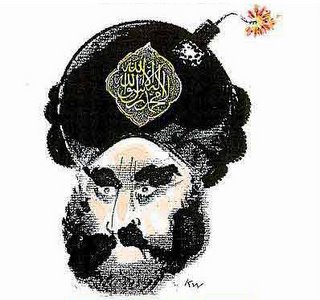 Thanks to a piece in The American Thinker, we have found another rather bizarre “feature” on the Reuters Foundation AlertNet. Now, this is quite complicated. Reuters Foundation is a special section of Reuters that caters primarily for NGOs and charities. Thus the stories that they run they are supposed to choose from the main Reuters website with those “clients” in mind.
Thanks to a piece in The American Thinker, we have found another rather bizarre “feature” on the Reuters Foundation AlertNet. Now, this is quite complicated. Reuters Foundation is a special section of Reuters that caters primarily for NGOs and charities. Thus the stories that they run they are supposed to choose from the main Reuters website with those “clients” in mind.This is, therefore, the first mystery: why would a story about the arrest of terrorists who are Muslims in Denmark be of special interest to NGOs and charities?
Then we come to the story itself. The news part of it is really quite straightforward: two months ago the Danish police arrested seven people, all of them Muslim and, at least some, second generation inhabitants of Denmark, on suspicion of planning terrorist acts.
Authorities said the seven held in Odense had collected materials to make explosives for an attack in the Nordic country, which has troops in Iraq and Afghanistan. The potential target was not revealed but Justice Minister Lene Espersen said the incident was one of the most serious ever in Denmark.Going on, the story explains:
The Danish arrests followed a plot uncovered in Britain to blow up planes and two unsuccessful train bombings in Germany. In all three cases, law enforcement officials described the suspects as a new generation of young Muslim radicals, some of them born in Europe, who are willing to use violence against their home countries.Nobody is denying the fact that we in Western Europe have a problem with some of the second and third generation Muslim youngsters, who are being radicalized. Britain’s problems are greater than other countries’. Furthermore, it is very good to see that the police forces of the three countries involved (and perhaps those of others) have managed to co-ordinate their activities and exchange information without the nonsense of Europol or Eurojust.
That is not the point The American Thinker has rightly raised. It seems that the Reuters journalist, Gelu Sulugiuc, has decided to turn the slightly old news story into a rather odd feature, whose title explains quite clearly the tone of it: “Danish Muslims say arrests hurt integration hopes”.
Well diddums. Another whinge piece about the wrongness of arresting terrorist suspects (who are likely to receive much better treatment and a considerably fairer trial than, say, Salahuddin Shoaib Choudhuri, about whom we wrote yesterday.

The entire feature is predicated on this flow of ideas: Denmark, a formerly liberal country, has now blotted its copybook by (gasp!) publishing those Mohammed cartoons, which action all by itself, with no help at all from certain radical imams, caused riots and arson throughout the world where the religion of peace congregates; however, those days are now behind us and the Danes should really be concentrating on making up to the Muslims in their midst, some of whom are alienated by all this insistence on free speech; the latest arrests on charges of terrorism have now added fat to the fire, alienating and frightening the Muslims in Denmark even more (no mention of Muslims who might be quite pleased that potential terrorists disappear from their midst) and were altogether a mistake.
On the whole, this is not the way most of us, including most Danes view the matter. The problem here is not that certain journalists write such stuff in their opinion columns. That is what those columns are for. The problem is that a supposedly unbiased news agency sends a feature article like this round the world, creating the impression that this is the standard, accepted, unbiased opinion.
I hate saying it but it is time Reuters (and, of course AP, whose output is far worse) had a closer look at its journalistic staff.
COMMENT THREAD
No comments:
Post a Comment
Note: only a member of this blog may post a comment.